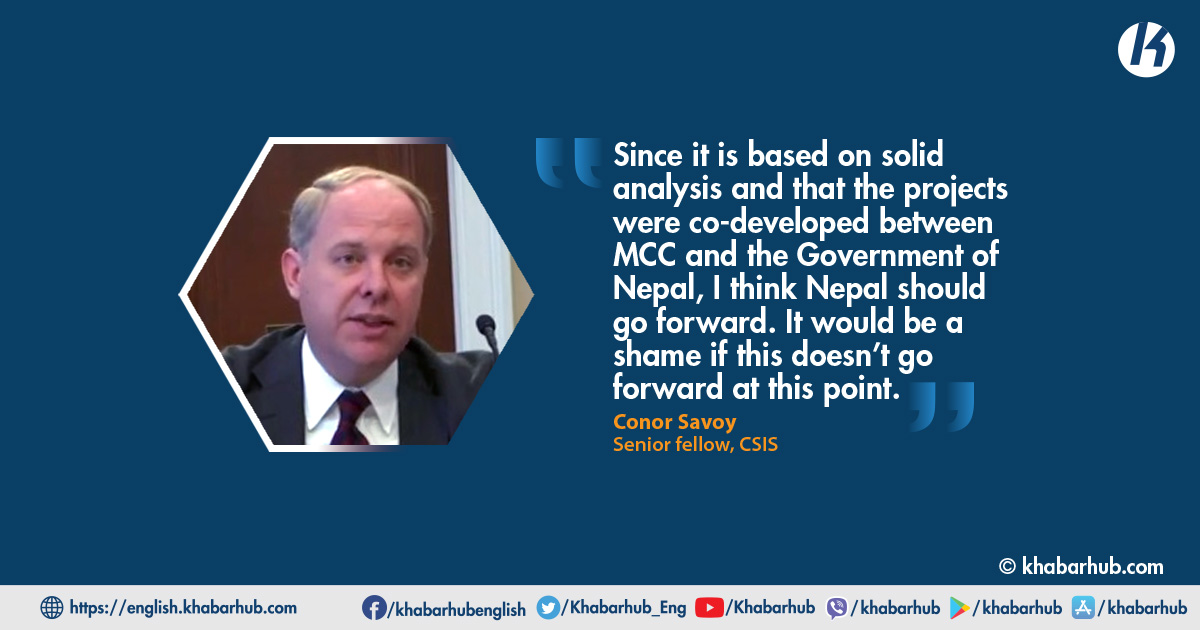Conor Savoy is a senior fellow with the Project on Prosperity and Development at the Center for Strategic and International Studies (CSIS).
Prior to CSIS, he was the executive director of the Modernizing Foreign Assistance Network, where he worked closely with U.S. government development agencies, implementing partners, Congress, and other stakeholders to advance a positive aid reform agenda.
In addition to his work at CSIS, he frequently consults with U.S. government agencies, NGOs and other implementing partners, and the private sector on evolving trends in international development.
Dr. Pramod Jaiswal, Strategic Affairs Editor at Khabarhub had a discussion with Conor Savoy, a senior fellow with the Project on Prosperity and Development at the Center for Strategic and International Studies (CSIS) on Millennium Challenge Corporation and Nepal.
How is MCC different from USAID and other development models? What are the success stories of MCC and why did it fail in some other countries? For example, Sri Lanka. When it comes to the hard infrastructure project that MCC focuses on, it is often compared to China’s Belt and Road Initiative project. How does China come across the MCC Radar?
First, MCC has the scorecard and it is only focused on countries that are seen as high performing. However, USAID is in 85 countries around the world and it programs across multiple sectors, in fact nearly every sector that you can think of from a development perspective.
MCC has taken a far more targeted approach in how it programs its funds and that’s really driven by the process where MCC enters into a close partnership with a country, they undertake what’s called a “constraints to growth analysis” that seeks to identify binding constraints to economic growth in the country in question.
And then in partnership with the country, MCC and the country co-design projects that are meant to address these binding constraints approach and so what you end up having is a five-year partnership; that is usually several hundred million dollars in size but has some three or four, maybe fewer projects, that are very specifically targeted to addressing these binding constraints to growth.
MCC also from the beginning has had the mandate to evaluate and monitor the impact that the projects are achieving, there’s been a commitment to the use of evidence, in designing the projects, and this really stands in marked contrast to that vast majority of USAID projects that still are not evaluated and not in the way that MCC Compacts are.
This has really given us a good understanding of how the actual impact that MCC is having through its country Compact system, and importantly, it uses an economic rate of return as a common indicator and so there is a way to really understand across the different Compacts the impact that MCC is having through its work.
I think in terms of its success, MCC has had a lot of success at the country level; I think you’ve seen multiple projects, I’m thinking of in places like Ghana, where it’s constructed a highway that has really generated a lot of economic return for the projects, it’s undertaken land reform in a number of Compacts that has also generated clear economic returns.
It’s not directly tied to the way that USAID is more directly tied to the State Department and sort of often is used for more direct U.S National Security or foreign policy objectives and that is by design.
So, MCC has had a lot of success and I think I’m going to tie this to where I see failure and what I want to say is I see the failure in MCC with two things; at the macro-level, MCC was launched in 2004 with a commitment to working with countries that were making progress on the governance, that had a strong commitment to governance reform and had a strong commitment to economic reform to create a market-based economic growth.
There was a sense at the time that MCC could be a transformational approach, that it could really by taking this very targeted slug or a large chunk of money and directing it towards what was clearly identified as the binding constraints to growth that you could transform development in a particular country and I think we’ve never really truly seen that.
I think that’s reflected by the fact that you’ve seen rather than just one Compact in a country you’ve now seen multiple Compacts in some countries.
Ghana has had two Compacts, Cape Verde has had two Compacts, the Philippines is developing a second Compact and Indonesia is developing a second Compact.
So, it’s never quite achieved that transformational approach and you’ve seen it kind of step back from that over time and where I would say there have been micro failures; you’ve seen Compact suspended- Madagascar is a good example of this, Tanzania’s second Compact was suspended.
You mentioned some of the issues with Sri Lanka and that reflects the reality that in a lot of contexts, the commitment to governance reform and the commitment to growth reform is very challenging; it’s not as simple as we want it to be sometimes and it has made it very difficult in some contexts to continue a Compact because of the scorecards and the high and the hard hurdles that are associated with that.
If things happen like a coup, if there is backsliding on other corruption indicators, the MCC is dedicated to ending it and I think in some ways that are actually refreshing because it is saying – No we need to see a commitment if we’re going to continue funding the projects under the Compacts.
I think where we’ve often seen issues with other development programs, you’ve simply continued the funding and there’s no accountability with the country.
Accountability is a two-way street. Yes, there’s accountability on our side but there needs to be accountability on the other side as well and that commitment to maintaining the reforms that would get you to where you want to be over time from a transformational perspective.
And it’s hard to really characterize it as a ‘failure’. I actually think one of the stronger aspects of the MCC model is that it’s not just the commitment to funding something, but it’s also saying we’re going to stop if we don’t feel like the commitment to reform remains strong.
You bring up China and I think China is an interesting perspective and you’re absolutely right MCC is sometimes seen as part of the US response to the Belt Road Initiative.
This is because the vast majority of MCC Compact dollars have been programmed toward infrastructure projects, I think it was something like 70 percent or so over the history of MCC has gone towards hard infrastructure projects.
This represents the reality on the ground that the lack of infrastructures, the lack of functioning infrastructure does present a binding constraint to growth in a lot contexts, the reality is that prior to MCC, the US government had largely gotten out of the infrastructure game; we were not funding infrastructure through our other development agencies.
This is something that we had done many years ago but had largely moved away from in the 1970s and 1980s over sustainability issues and the belief that aid should be directed toward meeting basic human needs.
So MCC is part of that. I think the reality is it can only do so much when you look at it in terms of the amount of money and so therefore you have to see it as a component of a broader US response alongside the development finance corporation that was instrumental in moving during the Trump administration but also alongside our other tools like USAID and the state department and other development agencies.
And I think again, it’s on the part of the United States government to really present this as an alternative, present this as a more sustainable approach to the model that China’s offering via Belt and Road which is by and large state-to-state loan financing for infrastructure projects that are not necessarily tied to the same kind of economic analysis that MCC, for example, offers or the Development Finance Corporation offers via the private sector.
People have talked about sustainability, this is absolutely part of the China Model and I think it’s one that we should all be concerned about and again, I would say through MCC and the DFC; the US government offers a more sustainable model that’s built on building projects that will actually achieve growth or help to achieve growth in the long run.

Is there a link between MCC and Indo-Pacific strategy? In Nepal often MCC is linked with the Indo-Pacific strategy, so do you think there is any link between the two?
MCC is largely meant to be free of the foreign policy objectives that often influence other parts of U.S foreign assistance.
It’s not directly tied to the way that USAID is more directly tied to the State Department and sort of often is used for more direct U.S National Security or foreign policy objectives and that is by design.
Do you think there is the role of regional powers or geopolitical factors behind making MCC controversial or making it difficult to get endorsed because Sri Lanka and even Nepal raise the issues of sovereignty? Was it easy for Sri Lanka, which is facing an economic crisis, to reject such a huge grant, while the nation is acquiring loans from China and getting into a debt trap?
I think on the question of sovereignty, the MCC model very clearly turns most development models on its head in that it is designed in partnership with the country.
So Nepal worked with the MCC to design the Compact projects, there is an agreement and it will be implemented by a staff that is overwhelmingly majority Nepali and it’s based in Kathmandu and it will run as an adjunct to Nepal’s government.
This is the model that MCC very much took on. It’s one that I think is part of a response to the need for greater country ownership in development.
USAID is still not really there and so it is much different. I think from a sovereignty perspective, MCC really is meant to do no harm but I think there can still be concerns once a Compact is underway that may lead to the Compact being canceled or suspended because there has been backsliding or because there’s been a coup in the case of Mali, for example, a Compact was suspended there, Madagascar the same thing.
This happens. I think from a regional perspective when you’re looking at countries like Nepal or Sri Lanka obviously, there are geostrategic considerations here, Sri Lanka with the port that the Chinese built, there are some serious concerns.
That is however not what is driving MCC Compacts in these countries. There are other ways in which the US government would seek to influence or engage the geostrategic issues that are emerging in the region either via our partners or directly with the governments themselves via our other means to engage whether it’s the State Department, USAID, the Development Finance Corporation and other tools like that.
If Nepal does not approve MCC, what will Nepal lose? There is a fear in Nepal that if MCC is not passed it will isolate Nepal among the international community in general and the U.S in particular. How far is this true? Do you think it is likely?
I don’t really see isolation happening given that USAID has a large mission presence in Nepal, it’s been a long-running presence and we also have our embassy in Nepal.
I would really underscore it’s one piece of our overall relationship with the country of Nepal and that’s true for all of the countries that receive MCC Compacts.
It’s one piece of how the US government engages and so I don’t really see isolation happening. And again I’d underscore that I think the Compact’s been negotiated, it’s based on solid analysis and the projects that were co-developed between MCC and the Government of Nepal, I think should go forward and it would be a shame that this didn’t go forward at this point.
The case of MCC in Nepal is not encouraging. So how is America’s experience in dealing with the development projects under USAID? Is it different from MCC or do we have similar stories? Secondly, you may also share the experience of MCC and USAID or USAID issues in other countries where these institutions are working.
USAID is very constrained because of the way it gets the money from Congress, which has a lot of say in where USAID spends and on what USAID spends its money on.
They get a certain amount of money for global health, a certain amount of money for education, a certain amount of money for agricultural development and so on and so forth. Unlike MCC, which is a blank slate when it comes to a particular country,
USAID tends to say okay well we have this much money for this particular sector so they’ll design the projects and programs that will fit within that sector and there’s relatively little- not none but there is relatively little input from the local government or from local civil society. I wouldn’t say any, but there’s not a lot.
But again MCC really engages in partnership, in a genuine partnership with the local government to design the projects and then the local government implements the projects and that is an important distinction. If you care about the effectiveness of aid, small aid, assistance.
MCC is effective, it delivers country ownership in a way that a lot of other development programmings from the United States do not. And it respects the sovereignty of the local government in a way that you could perhaps make an argument that other development assistance does not always.
The MCC is delayed by years. How much does this delay cost Nepal or what has Nepal missed? And what are the gains for the US government if MCC gets endorsed? If MCC constructs the Electricity transmission line and road maintenance, how will it serve the American interest? How will it fulfill America’s interests?
There has been an opportunity cost but if we can take this forward, we don’t have to lose more. I think there is a clear opportunity here to move the Compact forward, to get it implemented, get it done and that will benefit Nepal in all of the ways it can benefit Nepal, so, there’s a very clear positive benefit here.
And just on benefiting US interests, I mean the United States obviously has an interest in seeing economic growth and stability in a country like Nepal as others have alluded to.
It is in a geostrategically important region of the world. But our primary interest with the Compact is to see the economic development of Nepal and the benefits that it will accrue on the social development side, whether it’s better health outcomes, better education etc but it is in our interest as we live in a globally connected world and whether there are people in our country who don’t believe that and elsewhere, it does matter.
It is in our interest to see economic development take hold in a country like Nepal or in Sri Lanka or wherever and I sincerely hope that this Compact goes forward because I think one of the benefits- one of the secondary benefits is it will strengthen the relationship between the United States and Nepal and I hope that we can continue to be seen as as a good partner and as one who’s trying to bring good benefits to the citizens of Nepal.









Comment